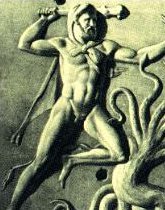|
 The "proof" of this is always stated to be the part in the fifth main scene of Euripides' play Hercules furens, in English Madness of Heracles, where Hercules (who is just about to bring Zeus an expiatory sacrifice) is described with the following words: The "proof" of this is always stated to be the part in the fifth main scene of Euripides' play Hercules furens, in English Madness of Heracles, where Hercules (who is just about to bring Zeus an expiatory sacrifice) is described with the following words:
"And everyone looks at the man who has been struck dumb and is completely changed, whose reddened eyes roll, from whose beard froth drips [...] He bears his body and struggles to breathe ."
Is this a partial-complex seizure which - as in Euripides' play - turns into a lengthy (epileptic or post-paroxysmal) twilight state with the patient unable to control his or her actions? |
|
We will never be know for sure, but this place in Euripides' play is a pointer to the fact that partial-complex seizures caused by a focal epilepsy can be extremely dramatic.
However, the century-old prejudice that people with epilepsy can "run amok" after or during a seizure and can be a danger to others has fortunately long been refuted. 
|


 The "proof" of this is always stated to be the part in the fifth main scene of Euripides' play Hercules furens, in English Madness of Heracles, where Hercules (who is just about to bring Zeus an expiatory sacrifice) is described with the following words:
The "proof" of this is always stated to be the part in the fifth main scene of Euripides' play Hercules furens, in English Madness of Heracles, where Hercules (who is just about to bring Zeus an expiatory sacrifice) is described with the following words:

